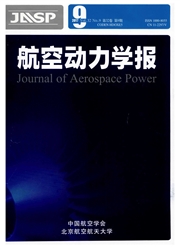

 中文摘要:
中文摘要:
基于空中和高原环境的特点,研究了柴油发动机散热器传热性能的高度特性;进一步建立了发动机热管理系统的流动和传热模型,研究了热管理系统的高度特性;给出了基于最小功耗原则的热管理系统运行参数匹配方法.在固定系统热负荷条件下的计算结果表明:随着海拔高度的增加,在空中环境下,散热器的散热性能先上升后下降,热管理系统中冷却液和润滑油温度先下降后上升,热管理系统所需的最小功耗先减小后增加;在高原环境下,散热器的散热性能随高度增加大幅下降,热管理系统中冷却液和润滑油温度大幅上升,发动机出现过热问题,为了给发动机提供足够的散热能力,热管理系统所需要的最小功耗随着海拔高度的增加而大幅增加.
 英文摘要:
英文摘要:
The effects of altitude on the heat transfer performance of the radiator in diesel engine were investigated based on the environmental characteristics of the flight height and high elevation plateau. The flow and heat transfer models of the thermal management system (TMS) of diesel engine were then established to investigate the effects of altitude on the TMS. Furthermore, the method for matching the operating parameters of the TMS un- der different working conditions was given based on the principle of minimum power con- sumption. The results under prescribed heat load conditions show that, at flight height, the heat transfer performance of the radiator increases first and then decreases with the increas- ing altitude, and the temperatures of the coolant and oil in the TMS decrease first and then increase whilst the minimum power consumption of the TMS decreases first and then increa- ses. In the elevated plateau area, the heat transfer performance decreases with the increasing plateau altitude, and the temperatures of the coolant and oil in the TMS increase significant- ly, causing the engine overheating. The minimum power consumption of the TMS increases remarkably with the increasing plateau altitude in order to provide enough heat dissipation a- bility for the engine.
 同期刊论文项目
同期刊论文项目
 同项目期刊论文
同项目期刊论文
 期刊信息
期刊信息
